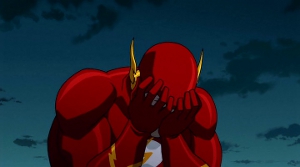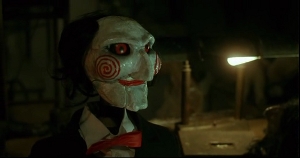
As I said in the Superman Unbound review, DC Comics uber-writer Geoff Johns got his job thanks to his love of those first two live-action Superman films (and The Goonies). Because of this, he talked himself into a job playing step-n-fetch-it for director Richard Donner. Because of this, young Geoff found time to make some friends at DC Comics while he and Donner were in New York, working on that Mel Gibson-led X-Files rip-off no one remembers anymore, Conspiracy Theory.
Within a few months, former Superman writer (now DC Group Editor) Eddie Berganza secured Johns a job penning Justice Society of America. “Written” at the time (though some of us suspected it was “written in name only”) by Notable Hollywood Screenwriter David S. Goyer, JSA evolved, under Johns tenure, into an occasionally-quite-nice microcosm of its home universe. While the modern Justice League is usually composed of characters with true cultural clout, instantly recognizable to even the least-literate among us, JSA thrived by combining characters from comic’s Golden Age with impetuous youngsters either inspired by their example or straight-up continuing some poor dead person’s legacy.
That’s the thing I’ve always liked about the DC Universe: a meta-textual awareness of its own history. Unlike Marvel Comics, where all roads lead back to Captain America and everything else gets shunted a decade or so down the time stream by Editorial Fiat whenever continuity headaches become epidemic, DC’s heroes come in distinct, generational blocks. The Old Guard started putting on masks and punching bad guys at some point in the mid-1920s. They did it for their own reasons, came together for World War II, and then drifted apart again for other reasons no writer seems interested in addressing, save obliquely, through peeks at Wacky Alternate Dimensions (like the Watchmen universe, which outlawed masked heroics in the 70s with its Keene Act). The New Guard of the “perma-modern” world, usually beginning with Superman, chose to go the “thong-and-blanket” route partially because of that preexisting heroic tradition. This adds historical depth to DC’s fictional world while eliminating the need for any one character to bare the full weight of being “the world’s first super-hero” (though Superman’s usually handed that title by sympathetic friends in the media). Continue reading Justice League: The Flashpoint Paradox (2013)

 Torture porn will probably never go out of fashion. Somewhere, in the dank bowls of some abandoned warehouse, or the Glade-scented heights of California office buildings, freshly swept by underpaid immigrant workers, filmmakers will continue to feed expendable characters into increasingly-ridiculous grist mills. And people will pay to see it, always and forever more. Self-appointed moral guardians should take note of this and realize the futility of their mission. It’s the way of the Force, kid, get used to it. Move on, and take your goddamned squeamishness with you. The rest of us will be over here, wondering how in the hell people can be so stupid to mistake this for a horror movie?
Torture porn will probably never go out of fashion. Somewhere, in the dank bowls of some abandoned warehouse, or the Glade-scented heights of California office buildings, freshly swept by underpaid immigrant workers, filmmakers will continue to feed expendable characters into increasingly-ridiculous grist mills. And people will pay to see it, always and forever more. Self-appointed moral guardians should take note of this and realize the futility of their mission. It’s the way of the Force, kid, get used to it. Move on, and take your goddamned squeamishness with you. The rest of us will be over here, wondering how in the hell people can be so stupid to mistake this for a horror movie?